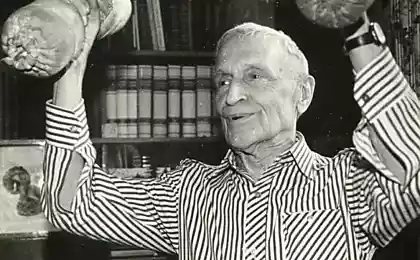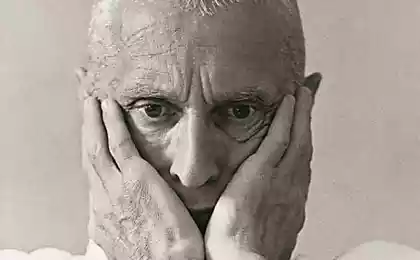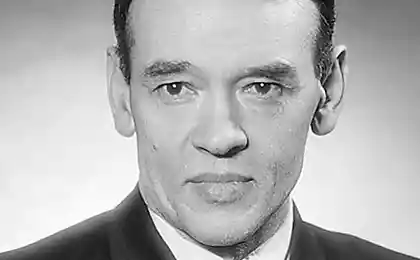313
9 Academician Amosov Tips: A Path to Health and Longevity

Academician Nikolai Mikhailovich Amosov is an outstanding cardiac surgeon, scientist and philosopher
Nikolai Mikhailovich Amosov (1913-2002) was an outstanding Soviet and Ukrainian cardiac surgeon, scientist, creator of the first department of cardiovascular surgery in the USSR, author of innovative methods in medicine and progressive views on a healthy lifestyle. His approach to health goes far beyond traditional medicine and touches upon the fundamental principles of self-regulation, self-discipline, and personal responsibility for one’s own health.
Academician Amosov’s advice, formulated several decades ago, is especially relevant today, when the epidemic of chronic diseases caused by a sedentary lifestyle and unhealthy diet takes on a global character. In an era when the pharmaceutical industry offers a pill for any ailment, Amosov’s words about personal responsibility for health take on special value.
Personal responsibility for health
“Most diseases are not the fault of nature, not of society, but of man himself. Most often he suffers from laziness and greed, but sometimes from irrationality. ?
This is the first and perhaps the most important principle in Amosov’s philosophy of health. Shifting responsibility for one’s own health to external factors is a convenient but destructive position. Modern science confirms the correctness of the academician: according to the World Health Organization, up to 80% of cardiovascular diseases and cases of type II diabetes can be prevented by lifestyle correction.
Practical advice: Keep a health diary, where daily note your physical activity, nutrition and well-being. This will help you see a direct link between your actions and your body.
Amosov ruthlessly criticizes the two main causes of ill health: laziness and greed. Laziness manifests itself in the reluctance to move, engage in physical exercises, preferring passive rest to active. Greed - in excessive consumption of food, especially high-calorie, in late dinners and snacks. These two factors cause most metabolic disorders.
A Critical View of Medicine
“Do not rely on medicine. It treats many diseases, but can not make a person healthy. It doesn’t even teach people how to be healthy. Be afraid to be taken prisoner by doctors!
Amosov’s claim may seem controversial, especially in today’s world of high-tech medical technology. However, the academician speaks not about distrust of medicine in general, but about understanding its boundaries and possibilities. Modern medicine is really focused more on the treatment of diseases than on maintaining health.
Studies show that the following factors affect health:
- Lifestyle: 50-55%
- Ecology - 20-25%
- Heredity: 15-20%
- Health care - 8-10%
Traditional medicine copes well with acute conditions and saves lives, but in matters of chronic diseases related to lifestyle, its options are limited. Medications mask symptoms, but rarely address the underlying causes of ill health.
Instead of relying solely on blood pressure or cholesterol pills, invest time and effort in lifestyle changes. In the long run, this will produce a much more sustainable result.
Health efforts
“Being healthy requires one’s own efforts, constant and significant. Nothing can replace them. Fortunately, a person is so perfect that you can almost always return to health. ?
Numerous studies confirm the amazing ability of the human body to recover. Even after decades of unhealthy lifestyles, the body can significantly improve its function with the right approach.

Regular physical activity is the basis of health at any age
The history of Amosov himself is a vivid example of this principle. After undergoing heart surgery at the age of 79, he developed and applied his own recovery system, which included daily exercise with a gradual increase in intensity. As a result, he returned to a full life and lived another ten active years.
Practical advice: Start small. Even 10-15 minutes of daily exercise is better than nothing. Gradually increase the load, focusing on well-being, not external standards.
Motivation and strength of character
“The magnitude of any effort is determined by motives, motives by the significance of the goal, time and probability of its achievement. It’s a shame, but also a character!
Amosov acutely understood the psychological aspects of a healthy lifestyle. It’s not enough just to know what to do – you need intrinsic motivation and willpower to constantly follow the principles of health.
Modern psychology confirms the views of Amosov. Sustainable lifestyle changes require:
- A deep understanding of personal motives (why it matters to you).
- Setting specific, measurable and achievable goals.
- Creating a supportive environment.
- Regular monitoring of progress.
- Reward system for achieving intermediate goals.
Amosov notes with regret that many people begin to seriously engage in health only in the face of serious illness or death. This observation is confirmed by modern medical practice: most patients are ready to radically change their lifestyle only after a heart attack or other serious illness.
The Four Pillars of Health
“Four conditions are equally necessary for health: exercise, dietary restrictions, hardening, time and the ability to rest. And the fifth is a happy life!
In this thesis, Amosov was ahead of modern health science, which today comes to similar conclusions. Let’s take a closer look at each of these pillars.
1. Physical activity
Current research strongly supports the importance of regular physical activity. The American Heart Association recommends at least 150 minutes of moderate aerobic activity or 75 minutes of intense activity per week.
Practical advice: Choose physical activity that brings pleasure. This can be walking, swimming, dancing or team sports. The main thing is regularity and sufficient intensity.
2. Nutrition restrictions
Amosov was a proponent of moderation in eating and weight control. Modern nutritional science supports the benefits of moderate calorie restriction for health and longevity. Studies show that intermittent fasting and a general reduction in calorie intake (without a lack of essential nutrients) contribute to longevity and reduce the risk of chronic diseases.
Amosov's principle of "weight = height (in cm) minus 100" is not universal and should be adjusted to individual characteristics. Modern medicine uses more sophisticated methods to assess optimal weight, including body mass index (BMI) and body composition analysis.
3. Hardening
Hardening and adaptation systems to the cold are experiencing a new peak in popularity. Cold exposure techniques, including contrast showers, cryotherapy and winter swimming, are being actively researched by science. Preliminary results show a positive effect of moderate cold stress on immunity, cardiovascular system and overall body resilience.
4. Rest and stress management
Amosov understood the importance of rest and relaxation long before stress was recognized as a key factor in many diseases. Modern science confirms a direct link between chronic stress and the development of cardiovascular disease, diabetes, autoimmune disorders and even oncology.
Practical advice: Learn at least one relaxation technique – meditation, deep breathing, progressive muscle relaxation, or yoga. Regular practice of these techniques has been proven to reduce stress levels and improve health.
5. A happy life
The fifth element of health according to Amosov - happiness and satisfaction with life - is confirmed in modern studies of psychosomatic medicine. Positive emotions, meaningful activities, and quality social connections directly affect physical health, boosting immunity and reducing inflammation.
Minimum required physical activity
“Nature is merciful: 20-30 minutes of exercise a day is enough, but one that suffocates, sweats and doubles the pulse.”
This thesis of Amosov is very close to modern recommendations for high-intensity interval training (HIIT), which show high efficiency at a relatively small cost of time. Research confirms that short intense exercise may be more effective than long-term low-intensity training to improve cardiovascular health and metabolism.

Four pillars of health according to Amosov: physical activity, restrictions in nutrition, hardening and proper rest
Practical advice: Try Tabata training - 4 minutes of high-intensity exercises according to the scheme of 20 seconds of work / 10 seconds of rest. This short but effective training is fully in line with Amosov’s recommendations.
Weight control
“One must limit oneself in food. Maintain weight growth (in cm) minus at least 100.”
Amosov's formula "weight = height - 100" is a simplified version of the estimate of optimal weight. Modern medicine uses more accurate methods, including body mass index (BMI), which takes into account the ratio of weight to height, as well as analysis of body composition to determine the percentage of fat.
However, the principle of weight control and dietary moderation remains extremely relevant. Modern research has linked overweight to an increased risk of cardiovascular disease, diabetes, certain cancers and musculoskeletal problems.
Modern nutrition science emphasizes the importance of not only the quantity but also the quality of food consumed. A Mediterranean diet rich in vegetables, fruits, whole grains, fish and olive oil shows the best results for long-term health and the prevention of chronic diseases.
Stress management
“To be able to relax is a science, but it also requires character. If he was!
The ability to effectively manage stress is becoming an increasingly important skill in today’s world. Chronic stress is recognized as a risk factor for most chronic diseases, including cardiovascular, autoimmune and neurodegenerative diseases.
Amosov notes that the ability to relax requires not only knowledge of the appropriate techniques, but also character - discipline and consistency in their application. This observation is supported by modern research: regular practice of relaxation brings the greatest benefit, but it is regularity that often becomes a stumbling block.
Practical advice: Start with 5 minutes of mindful breathing daily. Gradually increase the time to 15-20 minutes. Use special reminder meditation apps to form a habit.
Health and happiness
“A happy life. They say that health is happiness in itself. This is wrong: it is easy to get used to health and stop noticing it. ?
Amosov rightly notes that health is a necessary but insufficient condition for happiness. Modern positive psychology confirms this observation: for a sustained sense of happiness and life satisfaction, meaningful activities, high-quality social connections, a sense of personal growth and other components of well-being are also necessary.
At the same time, studies show feedback: happy and satisfied people are statistically less likely to get sick and recover faster from illness. Thus, happiness and health form a positive vicious circle, reinforcing each other.
Conclusion
Nine tips of academician Amosov, formulated decades ago, not only have not lost their relevance, but also received many scientific confirmations in modern medicine and health psychology. His holistic approach to health, including physical activity, nutrition, stress management and psychological well-being, is fully in line with modern integrative medicine.
Amosov’s message of personal responsibility for one’s own health is particularly relevant in an era of growing burdens of chronic noncommunicable diseases. To paraphrase an academic: Health is not something that someone can give you or sell you, it is something that you create by your daily efforts, choices and habits.
Glossary
Metabolic disorders
A complex of metabolic disorders in the body, including overweight, high blood sugar and cholesterol, high blood pressure. Often leads to the development of diabetes and cardiovascular disease.
High Intensity Interval Training (HIIT)
A training method in which short periods of intense anaerobic exercise alternate with less intense periods of recovery. It allows you to achieve significant results with minimal time.
7 annoying things you do because you want to always be right
Dunning-Kruger effect: Why does the knower underestimate himself and the ignorant overestimate himself?






















